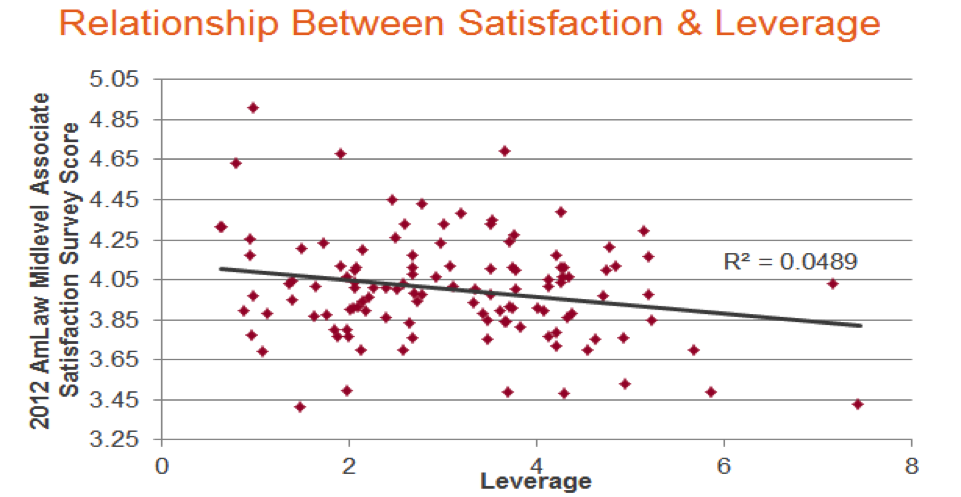Posted In: Talent Strategy
Fortune 100 General Counsel Recommended Reading: Examining the Relationship between Leverage and Lawyer Satisfaction
When the General Counsel of a Fortune 100 company recommends a book to me, I listen. Accordingly, when DuPont General Counsel Tom Sager suggested a book during a NALP Foundation meeting in January, I took note and put it on the “must read” list.
Of course, the best laid plans often go astray: I finally opened the book three months later. The book, entitled “Declining Prospects: How Extraordinary Competition and Compensation are Changing America’s Major Law Firms” was written by Atlanta corporate attorney Michael Trotter. If you haven’t picked it up, it provides an interesting history of legal industry since the 1950’s. Trotter posits that the following five factors have driven change in major business practice firms (defined by Trotter as large corporate firms) over the past 20 years:
- Increased supply of capable lawyers and law firms
- Higher cost of legal services
- Corporate law departments
- Commoditization
- Technology
Trotter’s five factors echo much of the current dialogue about changes in the legal industry. However, as it relates to talent strategy, Trotter’s perspective is somewhat more contentious. He states:
I believe that the growth in size of the major law firms in the United States and their increased utilization of leverage are two of the most significant changes that have negatively affected working conditions in the private practice bar.
Trotter goes on to state that higher leverage means associates will receive less training, less supervision, less of a personal bond with senior lawyers, and less meaningful and challenging work. He also asserts that a lower leveraged firm can offer its associates a better working environment, and that “because the odds are better that an associate with the lower leveraged firm will remain with the firm, the partners should be not only more able but more willing to make the effort necessary to train their associates well.” Trotter concludes that all of these factors work together to make life in a lower-leveraged firm more attractive for associates.
Taking Trotter’s views at face value, firm leaders might be tempted to reexamine their leverage model. But are lawyers at highly leveraged firms actually less satisfied? No, according to the results of the most recent AmLaw Midlevel Associate Satisfaction Survey. The survey, discussed in an earlier blog, asked third through fifth year associates to rate their job satisfaction. I examined each of the firms included in the survey and correlated their satisfaction score with their leverage. Here’s what I found:
Each point on the chart above represents a law firm included in the 2012 AmLaw Midlevel Associate Satisfaction Survey. The firm’s score is represented on the Y axis, and their leverage ratio is represented on the X axis. As you’ll see from the liner regression, there is a very weak inverse relationship between the satisfaction score and the firm’s leverage ratio.
What does this mean for law firm leaders? Lawyer satisfaction is derived from a number of factors, which must all work together in concert. An effective talent strategy includes many integral pieces working in concert, including recruitment, hiring, onboarding, staffing, performance management, professional development, partnership, succession planning, retention, motivation and engagement. A highly leveraged firm can promote engaged and satisfied lawyers, assuming the firm deliberately chooses a set of activities that aligns their most valuable resource – it’s people – to create a competitive advantage.
************************
Interested in Creating a Competitive Talent Advantage? Consider a LawVision Talent Strategy Audit
LawVision is excited to announce a new service that helps law firm leaders (1) Evaluate the effectiveness of their current talent strategy, (2) Benchmark their talent strategy relative to the market & competitors via the LawVision Talent Strategy Scorecard, and (3) Identify actionable recommendations to enhance their talent strategy. Click here to learn more, or contact Jessa Baker at (312) 813-3993.

No Comments